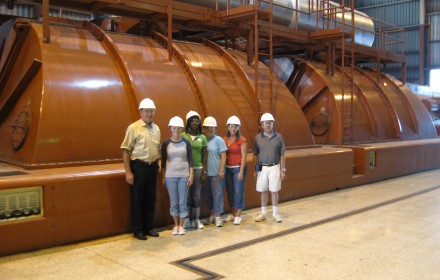Online Course Aims to Enhance Energy and Climate Change Studies in Elementary Schools

Converse education professor Dr. Wayne Cheser is passionate about advancing elementary school children’s awareness of energy and climate change issues – so much so that he spent two years researching and filming a set of DVDs for teachers that provide models of best practices for teaching the concepts. The DVDs are a centerpiece of his graduate-level course, EDU 585 – Advanced Methods in Elementary Science: Energy Education and Climate Change, which will be offered online during Summer 2012.
“Energy and climate change education should be a priority in public education,” Cheser says. “Here in South Carolina, trains loaded with coal that are headed for coal-fired steam power plants, seven nuclear power stations that dot the countryside, and hydroelectric dams that shape the landscape are sources of energy not clearly understood by most elementary students and teachers. Methane from local landfills fuel local industries, and wind turbines and solar panels are more frequently appearing in this area.”
“Energy and climate change education should be a priority in public education,”
Cheser noticed a need for energy education and climate change education while visiting area schools over the past decade and while training pre-service and in-service teachers in science education. He also scores science fair projects regularly, and has noted that energy and climate change projects are rarely present. “I would like to change that and increase the awareness of the next generation because they will need to be better informed about energy sources, energy conservation, and good stewardship of the planet’s water, air, and other natural resources.”
The starting point for realizing this vision is equipping teachers with the knowledge and tools to energize students.
“Teachers will become more aware of the role of fossil fuels in their lives, the data that are being shared by climatologists as opposed to political pundits, and the place for renewable energy sources in our future,” he says. “Apart from filling up one’s gas tank and paying the light bill, most adults in our culture have very little information about the science of carbon-based fuels, the effects of the industrial revolution on our atmosphere, the strategic role of ice in moderating the planet’s temperature, etc. My goal is to shed as much non-political light on these topics and concepts as possible.”
The DVDs include demonstrations, experiments, and visual presentations of energy and climate concepts that are covered in elementary and middle-level science standards and textbooks. Their topics ranging from states of matter, drilling for oil, how a nuclear power plant works, the multiple causes of greenhouse gases, going green, a ‘visit’ to Antarctica, the thermo-haline conveyor, and more. Teachers enrolled in the course will use the DVDs during the course and be able to take them back to their classrooms as teaching tools.
Cheser, who is associate professor and director of early childhood education at Converse, found the perfect merger of his interests and abilities in designing the course. “I have a wide range of interests, which include the study of geology, weather and atmospheric science, oceanography, and the forces of wind, water, and the atom. Energy sources and climate change research bring together all these areas.”
Shelley Robbins of Upstate Forever, a nonprofit organization that promotes sustainable communities and clean air and water, praised the course noting, “Dr. Cheser’s work is much needed in South Carolina, where per capita energy consumption is higher than the national average. And there is no better place to start teaching these systems and scientific relationships than in our elementary schools and junior highs where students are first learning biology, chemistry and physics as well as what a complex biological system our planet is. These kids are South Carolina’s future leaders, policy makers and voters. They need to understand that they are not powerless and that daily decisions do matter.”